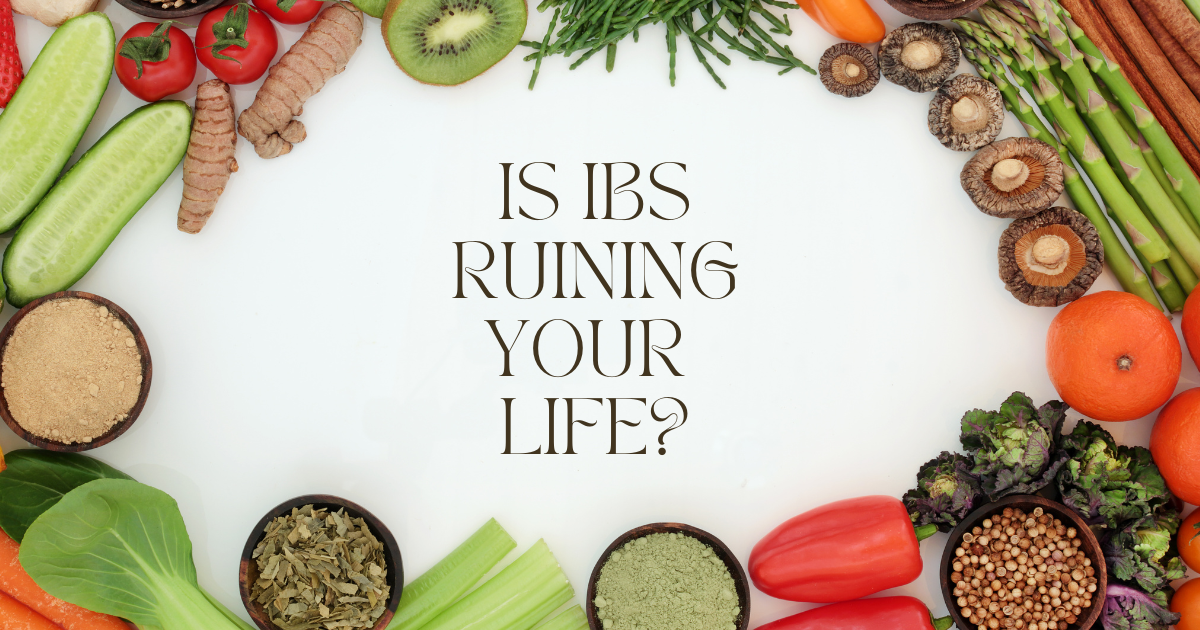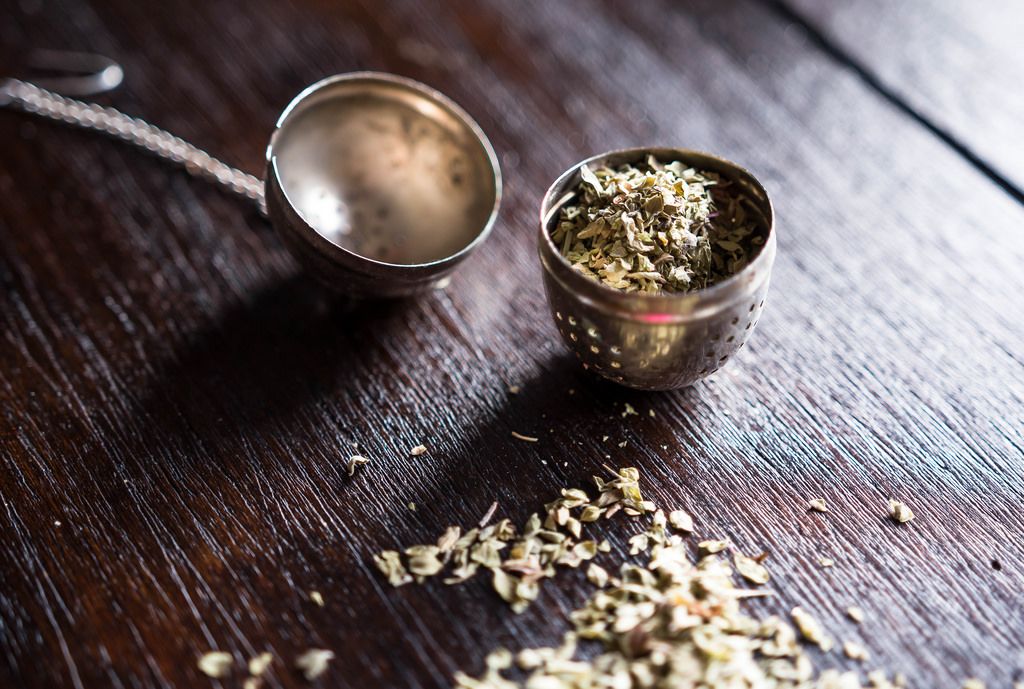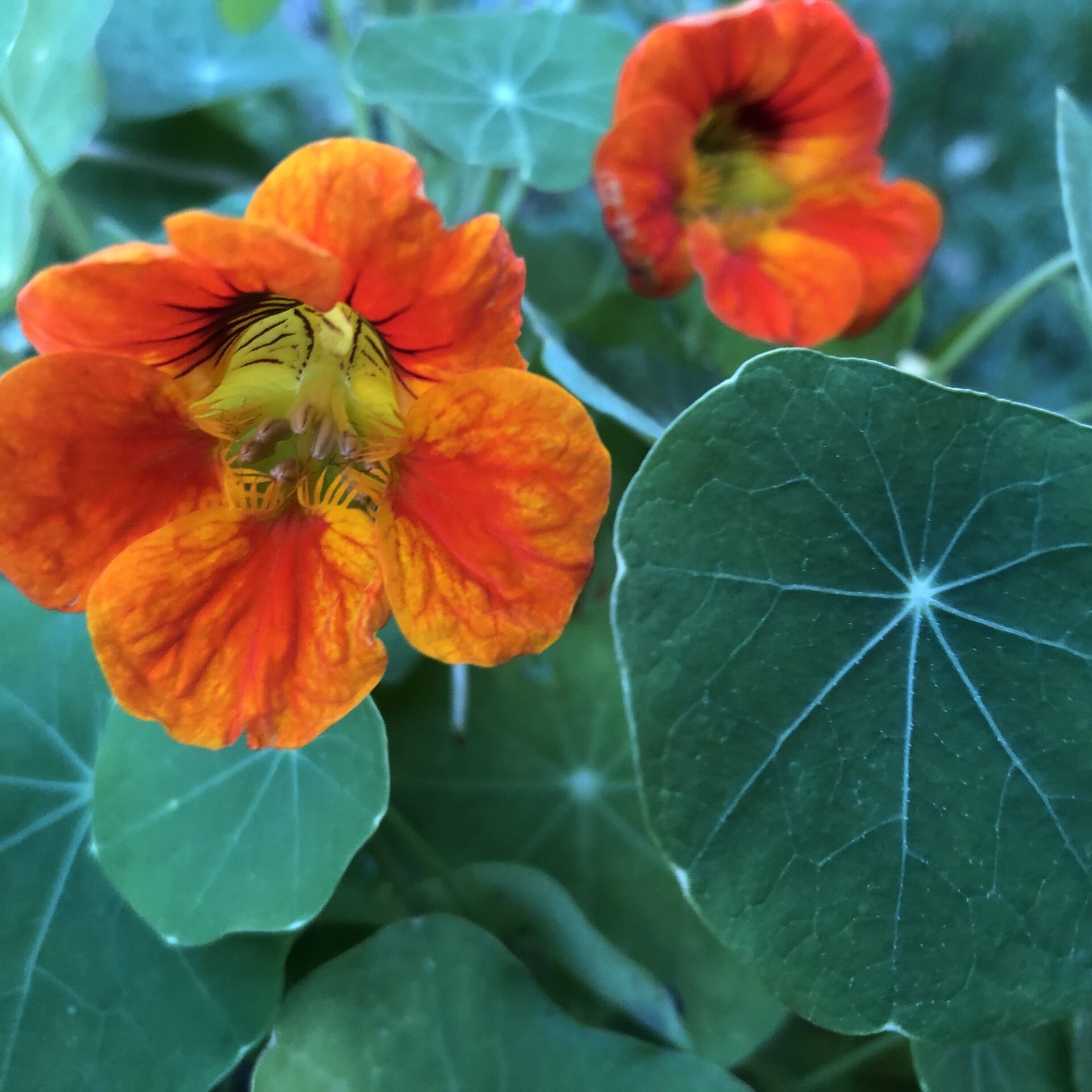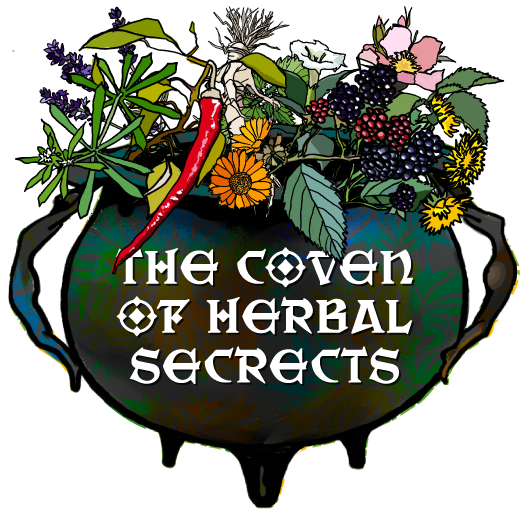When you’re going out, you need to know what options there are at the restaurant because you might accidentally eat something that will trigger a trail of events internally that make you need to rush up off your seat and leg it to the nearest loo.
IBS can be a right old pain in the backside! Literally. Well, a pain in the abdominal area anyway!
Bloating, pain especially in the left lower part of the abdomen, constipation or bouts of diarrhoea and reactions to certain foods, all potentially part of the IBS or Irritable Bowel Syndrome.
How allopathic* medicine views IBS

Irritable Bowel Syndrome (IBS) is seen as a common condition that while recognised in the modern medical profession as being very impactful on your life, it’s seen as having no cure. IBS is essentially a set of symptoms that are said in allopathic medical terms, to have no particular cause. However, in the herbalist mind, there are usually several reasons at the root. Each case is taken in its own right but there are commonalities that can be seen.
Stress, anxiety and trauma can trigger a heightened sensitivity to otherwise day to day foods to eat. The symptoms can become extremely debilitating and prevent enjoyment of meals out, time with or at friends houses or always having to consider where the nearest loo might be.
Main symptoms of IBS
Among the main symptoms are the presence of current or recurrent abdominal pain or discomfort associated with bloating, and altered bowel habits that can strongly alter the quality of life. Motility changes in the bowel can be constipation, intestinal rush or a sort of diarrhoea or switching between the two. Folk often report rabbit dropping-type poo where a full stool doesn’t form.
The nervous system and emotions in IBS: how are the guts and emotions interlinked?
The guts are the whole digestive tract from mouth to anus, encompassing mouth, pharynx (throat), oesophagus, stomach, small intestine,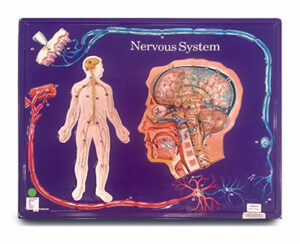 large intestine, rectum and anus.
large intestine, rectum and anus.
The beautiful dance of the nervous system’s activity as expressed through digestive upset, could be seen as the internalisation of emotions that are not processed or dealt with, then expressed physically in the body, namely the guts.
The brain and gastrointestinal tract are important organs responsible for detecting, transmitting, integrating and responding to signals coming from the internal and external environment. Think of phrases like ‘I feel it in my gut’, ‘butterflies in my stomach’, ‘my stomach is in knots’. All of these relate in some way to an emotional expression felt in the stomach and bowels. The nerves are so interlinked and emotions expressed in the digestive system that the guts are seen as a second brain even in modern medicine. In our understanding of the body, the heart is also a perceptive organ responding to neurotransmitters and emotion but the link with the brain-gut axis is presently the most studied.
Approaches to herbal support
We always approach IBS by looking first at the nervous system. Interestingly, lots of the nerviness herbs are also digestives like chamomile, fennel, lavender which can all be found in our belly blend tea mix. and makes one of the most effective herbal remedies for IBS.
Making Belly Blend Tea
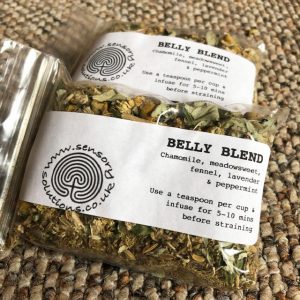 This soothing nervine, digestive blend is reached for often to help to restore and relax IBS symptomatology.
This soothing nervine, digestive blend is reached for often to help to restore and relax IBS symptomatology.
The blend varies depending on which herbs have been bountiful that year but we use various combinations of chamomile, fennel, mint, meadowsweet, lavender and oat straw.
Chamomile is a calming bedtime herb but with wonderful relaxing properties on the gut. It is a must for any bloating or cramping feelings, especially after eating certain foods. Chamomile also has bitter properties, stimulating the liver and resetting sluggish digestion. Not everyone can tolerate the taste of chamomile but it’s a great addition to a Belly Blend tea.
Fennel is one of our favourites, we talk about it a lot as Christopher Headley, wizard herbalist from London, and our mentor used to say, Hildergard von Bingen of German herbal fame used to say that ‘fennel forces the spirits into the correct balance of joy’. We agree. It’s a delicious carminative, digestive herb that subtly balances the nervous system. Neither stimulating or sedating, it lets the spirits.
Mint is a classic after dinner herbal tea used for indigestion and refreshment. It is carminative, soothing to the gut and refreshing for the palate.
Meadowsweet has risen to fame as a herb for stomach ulcers for its relaxing, healing and soothing properties for gut inflammation. We act with care where there are any heart palpitations present, meadowsweet, in our experience, can exacerbate these.
Lavender is a potent stomach relaxant and calming nervine. You need but a pinch and it is so powerful. It also has antiseptic properties if there is any infection linked to gastritis. We wouldn’t use lavender in pregnancy as it can affect hormone balance in the body.
Oat straw is a wonderful nourishing nervine. It rejuvenates frayed nerves and restores the spirit.
Any combination of these herbal remedies for IBS is wonderful for soothing and relaxing the nerves and gut.
One teaspoon of the mix can be used steeped in a cup of boiling water for 5-10 minutes, strained and enjoyed as a relaxing moment in time with a delicious cup of tea.
Meditation, talking therapies and more
For someone that experiences IBS they will often be seen rushing round and seemingly unable to prioritise their own needs and wellbeing.  Or there are anxieties beneath the surface from unprocessed emotions.
Or there are anxieties beneath the surface from unprocessed emotions.
Creating out time for yourself is extremely important in terms of stress management and ultimately for good health. This could be in the form of gentle exercise, a meditation, a stretching morning routine, and eating fresh healthy food. Making choices that will make you feel nourished and well supported.
Counselling or therapy generally can be a wonderful adjunct to the support of IBS treatment. It can help to remarry the way you feel emotionally and what is being projected out so that the digestion doesn’t have to take the hit any longer.
Diet
Sometimes eliminating foods that have become irritant will be necessary while the nerves and digestion can be re-set with the herbs and other additions. Many folk with IBS have already started to eliminate certain obvious foods that cause discomfort.
Recap on Herbal Remedies for IBS
Help is at hand, through herbs, therapy, tweaks in diet and lifestyle, improvements in IBS symptoms can occur. Harvesting or growing some of your own digestive and nerviness herbs is a way you can stay connected to the plants, to nature (a healer in herself), and to your own healing journey.
Notes:
*A system in which medical doctors and other healthcare professionals (such as nurses, pharmacists, and therapists) treat symptoms and diseases using drugs, radiation, or surgery. Also called biomedicine, conventional medicine, mainstream medicine, orthodox medicine, and Western medicine.
The word “allopathic” comes from the Greek “allos” — meaning “opposite” — and “pathos” — meaning “to suffer.” This word was coined by German physician Samuel Hahnemann in the 1800s. It roughly refers to treating a symptom with its opposite, as is often done in mainstream medicine.
It is sometimes viewed as a derogatory term. Orthodox means traditional so is often a misnomer applied to pharmaceutical medicine.

